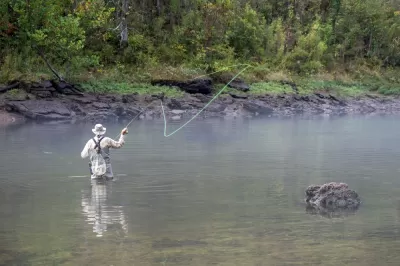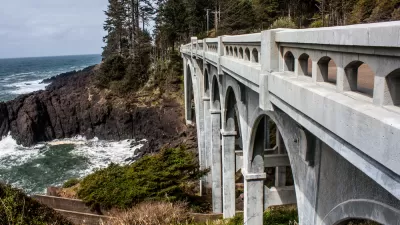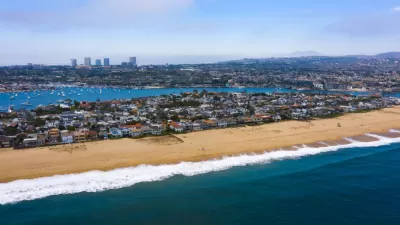Colorado is one of few U.S. states that has decided that private property owners supersede the public when it comes to access to rivers and streams.

“Who owns the beds of Colorado’s rivers?”
Ben Goldfarb reports for High Country News about a lawsuit that could change Colorado’s unique law that declares most of the state’s rivers to be non-navigable, and thus owned by adjacent property owners.
“From a river-access standpoint, Colorado is among the West’s oddest states,” explains Goldfarb. “Federal law dictates that the beds of ‘navigable’ rivers — waterways once used as highways for commerce — belong to the states, which, in turn, generally allow boaters and anglers to use them.”
“Colorado has historically denied that it even has navigable rivers,” adds Goldfarb. “In 1912, the state’s Supreme Court opined that the state’s waterways — steep, rushing, canyon-bound — were ‘nonnavigable within its territorial limits.’ By that logic, the beds of even major rivers belonged not to the state, but to the owners of adjacent private properties.”
Enter Roger Hill, who was repeatedly attacked by a property owner while fishing on the Arkansas River and decided to sue the property owners and the state, claiming that the river is, in fact, navigable.
More details on the case Hill has built to prove the river is navigable, with commercial traffic using the river back to the 1870s, is included in the article. Goldfarb also notes that Colorado is not the only state to litigate the issues of public access to rivers in recent years.
“In 2010, the Utah Legislature barred the public from wading non-navigable waters through private property, effectively closing more than 40% of the state’s miles of fishable streams; although anglers and boaters sued, a judge upheld the law last year,” for example. Advocates in New Mexico succeeded in fighting back a law that restricted access to the state’s rivers in 2015.
FULL STORY: The Colorado stream case that could revolutionize river access

Maui's Vacation Rental Debate Turns Ugly
Verbal attacks, misinformation campaigns and fistfights plague a high-stakes debate to convert thousands of vacation rentals into long-term housing.

Planetizen Federal Action Tracker
A weekly monitor of how Trump’s orders and actions are impacting planners and planning in America.

In Urban Planning, AI Prompting Could be the New Design Thinking
Creativity has long been key to great urban design. What if we see AI as our new creative partner?

Massachusetts Budget Helps Close MBTA Budget Gap
The budget signed by Gov. Maura Healey includes $470 million in MBTA funding for the next fiscal year.

Milwaukee Launches Vision Zero Plan
Seven years after the city signed its Complete Streets Policy, the city is doubling down on its efforts to eliminate traffic deaths.

Portland Raises Parking Fees to Pay for Street Maintenance
The city is struggling to bridge a massive budget gap at the Bureau of Transportation, which largely depleted its reserves during the Civd-19 pandemic.
Urban Design for Planners 1: Software Tools
This six-course series explores essential urban design concepts using open source software and equips planners with the tools they need to participate fully in the urban design process.
Planning for Universal Design
Learn the tools for implementing Universal Design in planning regulations.
Gallatin County Department of Planning & Community Development
Heyer Gruel & Associates PA
JM Goldson LLC
City of Camden Redevelopment Agency
City of Astoria
Transportation Research & Education Center (TREC) at Portland State University
Jefferson Parish Government
Camden Redevelopment Agency
City of Claremont





























